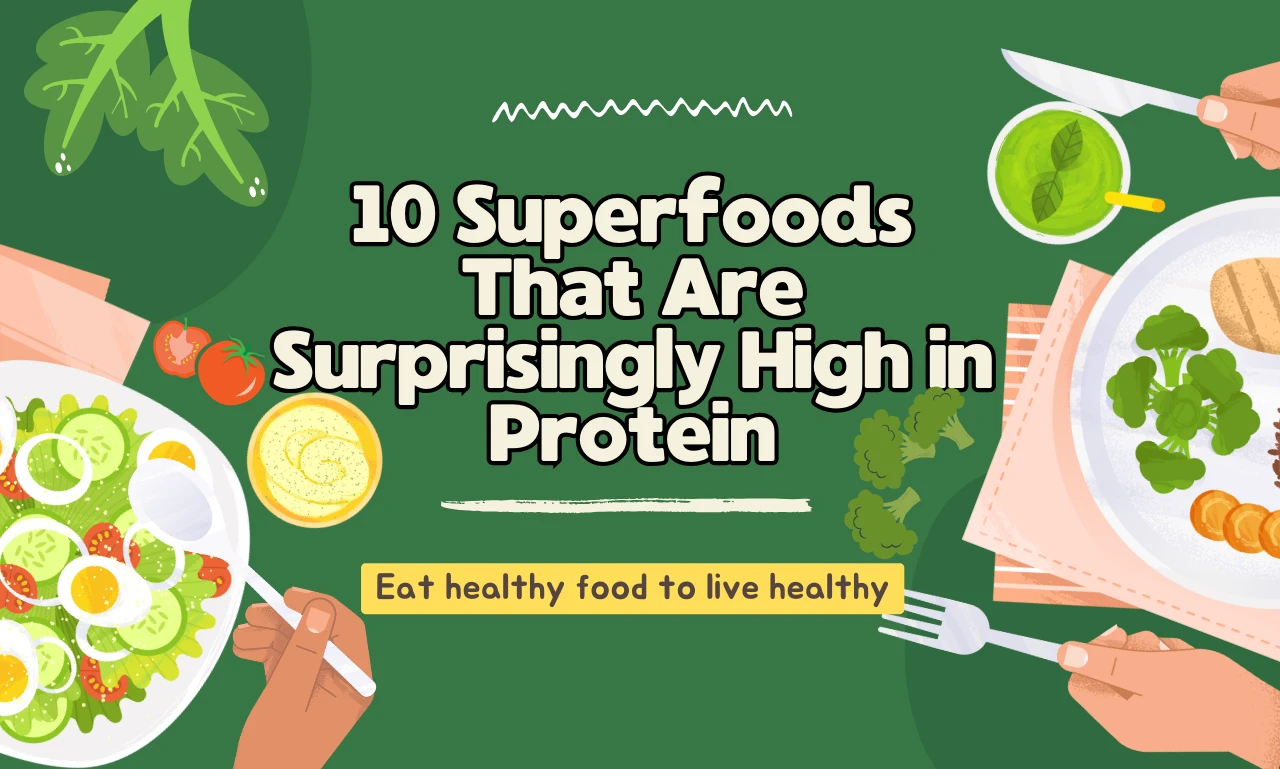Protein is an essential macronutrient that plays a crucial role in building and repairing tissues, producing enzymes and hormones, and supporting overall health. While many people associate high-protein foods with meat, eggs, and dairy, there are numerous superfoods that pack a surprising protein punch. Incorporating these protein-rich superfoods into your diet can help meet your nutritional needs and support weight loss, muscle growth, and overall wellness. Here, we’ll explore ten superfoods that are surprisingly high in protein.

1. Quinoa
Quinoa is often referred to as a “supergrain” due to its impressive nutrient profile. It is a complete protein, meaning it contains all nine essential amino acids.
- Protein Content: About 8 grams of protein per cooked cup.
- Nutritional Benefits: Rich in fiber, magnesium, iron, and antioxidants.
- Usage: Use quinoa as a base for salads, as a side dish, or as a substitute for rice or pasta.
Quinoa’s versatility makes it a great addition to any meal, providing a protein boost without compromising on flavor or texture.
2. Chia Seeds
Chia seeds may be tiny, but they pack a powerful protein punch. They are also rich in omega-3 fatty acids, fiber, and various essential minerals.
- Protein Content: About 4.7 grams of protein per ounce (2 tablespoons).
- Nutritional Benefits: High in omega-3s, antioxidants, and fiber.
- Usage: Add chia seeds to smoothies, yogurt, oatmeal, or use them to make chia pudding.
These seeds absorb liquid and form a gel-like consistency, making them perfect for thickening smoothies or creating healthy puddings.
3. Hemp Seeds
Hemp seeds are another plant-based protein powerhouse. They contain all essential amino acids and are easily digestible.
- Protein Content: About 10 grams of protein per 3 tablespoons.
- Nutritional Benefits: High in omega-3 and omega-6 fatty acids, fiber, and essential minerals.
- Usage: Sprinkle hemp seeds on salads, cereal, yogurt, or blend them into smoothies.
Hemp seeds have a mild, nutty flavor, making them a versatile ingredient in both sweet and savory dishes.
4. Edamame
Edamame, or young soybeans, are not only delicious but also rich in protein and other vital nutrients.
- Protein Content: About 17 grams of protein per cooked cup.
- Nutritional Benefits: High in fiber, vitamins, and minerals.
- Usage: Enjoy edamame as a snack, in salads, or as an addition to stir-fries and soups.
These green soybeans are often served steamed and lightly salted, making them a tasty and nutritious snack option.
5. Greek Yogurt
Greek yogurt is known for its creamy texture and high protein content compared to regular yogurt.
- Protein Content: About 10 grams of protein per 6-ounce serving.
- Nutritional Benefits: Rich in probiotics, calcium, and vitamins.
- Usage: Eat it plain, add fruit and honey, or use it as a base for smoothies and sauces.
Opt for plain, unsweetened Greek yogurt to avoid added sugars and maximize the health benefits.
6. Lentils
Lentils are a staple in many diets around the world due to their affordability and impressive nutritional profile.
- Protein Content: About 18 grams of protein per cooked cup.
- Nutritional Benefits: High in fiber, iron, folate, and antioxidants.
- Usage: Add lentils to soups, stews, salads, or use them as a meat substitute in dishes like lentil burgers.
Lentils come in various colors, including brown, green, red, and black, each with its own unique flavor and texture.
7. Pumpkin Seeds
Pumpkin seeds, also known as pepitas, are a crunchy, satisfying snack that is surprisingly high in protein.
- Protein Content: About 7 grams of protein per ounce.
- Nutritional Benefits: High in magnesium, iron, zinc, and healthy fats.
- Usage: Eat them as a snack, add them to salads, or sprinkle them on oatmeal and yogurt.
These seeds can be enjoyed raw or roasted and make a great addition to a variety of dishes.
8. Almonds
Almonds are not only a great source of protein but also packed with healthy fats, fiber, and essential vitamins and minerals.
- Protein Content: About 6 grams of protein per ounce (about 23 almonds).
- Nutritional Benefits: High in vitamin E, magnesium, and antioxidants.
- Usage: Enjoy almonds as a snack, add them to salads, or use almond butter in smoothies and on toast.
Almonds can be eaten raw, roasted, or used to make almond milk and almond flour.
9. Spirulina
Spirulina is a blue-green algae that is one of the most nutrient-dense foods on the planet.
- Protein Content: About 8 grams of protein per 2 tablespoons.
- Nutritional Benefits: High in B vitamins, iron, and antioxidants.
- Usage: Add spirulina powder to smoothies, juices, or sprinkle it on salads and soups.
This superfood is often available in powder or tablet form and can easily be incorporated into your diet.
10. Peas
Peas are a simple, versatile vegetable that is surprisingly high in protein.
- Protein Content: About 8 grams of protein per cooked cup.
- Nutritional Benefits: High in fiber, vitamins, and minerals.
- Usage: Add peas to salads, soups, stews, or use them in pasta dishes and casseroles.
Peas can be enjoyed fresh, frozen, or dried, making them a convenient addition to many recipes.
Incorporating these ten superfoods into your diet can help you boost your protein intake without relying solely on animal products. These foods not only provide essential protein but also offer a range of other nutrients that support overall health and wellness. Whether you’re looking to build muscle, manage your weight, or simply eat a more balanced diet, these superfoods are a great place to start.